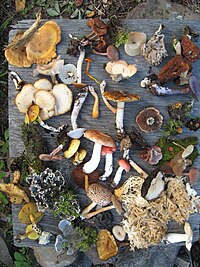
Photo from wikipedia
Biodiversity loss is rampant (1–3). To safeguard the future of life on Earth, there are growing calls for transformative change in biodiversity policy [i.e., for a fundamental and system-wide reorganization… Click to show full abstract
Biodiversity loss is rampant (1–3). To safeguard the future of life on Earth, there are growing calls for transformative change in biodiversity policy [i.e., for a fundamental and system-wide reorganization of how such policy is designed, implemented, and enforced across scales and sectors (1)]. Here we argue that to achieve this change, nations need to urgently implement robust biodiversity metrics into decisionmaking processes and policy. Because biodiversity sustains human life and economy, biodiversity metrics should be elevated to the same level as other core statistics and should be regarded as essential for guiding societies toward transformative change. Biodiversity metrics should be held to the same standards, rigor, and accuracy as any other nationally reported data, such as those on human population size, age structure, economic growth, and agricultural or industrial production. Measures of the state of biodiversity should thus be published as part of national statistics and mandated by legislation to ensure delivery. In March 2021, the 52nd United Nations Statistical Commission introduced the notion of biodiversity accounting in economic and financial decision-making, a move that represents an important step in changing international attitudes toward enhancing biodiversity policies. As researchers continue to gather knowledge on the structure, mechanisms, and determinants of biodi-
Journal Title: Proceedings of the National Academy of Sciences of the United States of America
Year Published: 2022
Link to full text (if available)
Share on Social Media: Sign Up to like & get
recommendations!